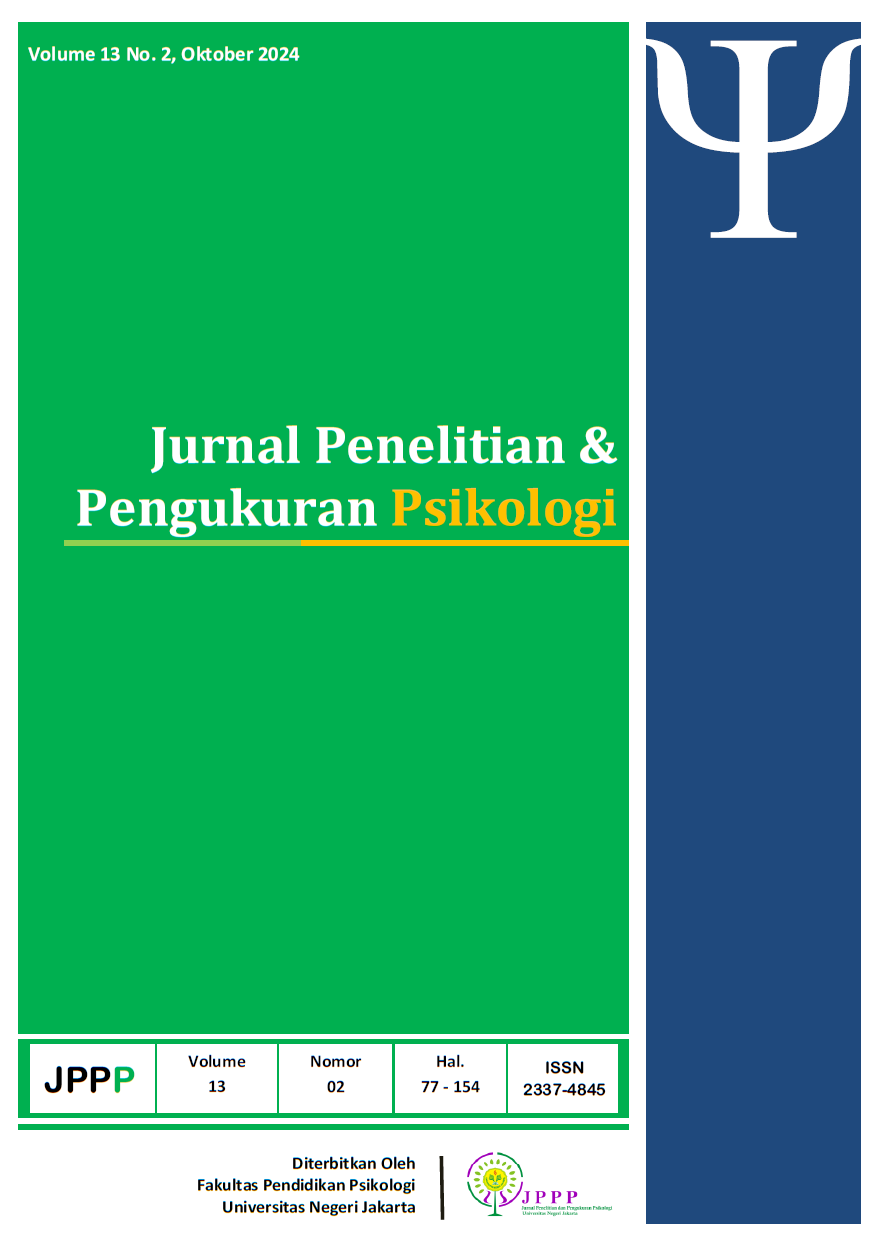Uji Validitas Adaptasi Skala Allophilia Terhadap Lansia
DOI:
https://doi.org/10.21009/JPPP.132.05Keywords:
allophilia, elderly, scale adaptationAbstract
Lansia di Indonesia akan terus bertambah dan diprediksi dapat menjadi populasi terbesar jika dibandingkan dengan kelompok usia lainnya. Orang-orang yang masuk kedalam kelompok lanjut usia ini perlu tetap menjalin hubungan tidak dengan orang seusianya saja, melainkan juga orang-orang yang lebih muda. Hubungan yang antara lansia dan generasi yang lebih muda dapat membentuk hubungan positif dengan memberikan dukungan sosial. Berbagai penelitian mencoba meningkatkan hubungan positif ini, sayangnya penelitian-penelitian tersebut belum memiliki instrumen alat ukur yang dapat dikatakan valid dan reliabel. Penelitian ini mencoba mengadaptasi alat ukur skala allophilia pada lansia ke Bahasa Indonesia, dengan melibatkan 304 partisipan. Metode adaptasi yang digunakan pada penelitian ini mengikuti panduan adaptasi alat ukur lintas budaya dan metode statistik exploratory factor analysis dan confirmatory analysis. Hasil penelitian menunjukkan bahwa alat ukur yang diadaptasi ke bahasa Indonesia menunjukkan alat ukur yang valid dan reliabel. Lebih lanjut alat ukur ini lebih sesuai jika digunakan menggunakan struktur solusi 2 faktor dibandingkan 5 faktor yang ada pada alat ukur berbahasa Inggris.
References
Abernethy, M. A., Dekker, H. C., & Grafton, J. (2021). The Influence of Performance Measurement on the Processual Dynamics of Strategic Change. Management Science, 67(1), 640–659. https://doi.org/10.1287/mnsc.2019.3442
Anthony, R. N., & Govindarajan, V. (2007). Management Control Systems (12th ed.). McGraw-Hill.
Baird, K., Su, S., & Munir, R. (2019). Levers of Control, Management Innovation and Organisational Performance. Pacific Accounting Review, 31(3), 358–375. https://doi.org/10.1108/PAR-03-2018-0027
Barros, R. S., & Ferreira, A. M. D. S. da C. (2022). Management Control Systems and Innovation: A Levers of Control Analysis in an Innovative Company. Journal of Accounting and Organizational Change, 18(4), 571–591. https://doi.org/10.1108/JAOC-09-2020-0137
Bedford, D. S. (2015). Management Control Systems Across Different Modes of Innovation: Implications for Firm Performance. Management Accounting Research, 28, 12–30. https://doi.org/10.1016/j.mar.2015.04.003
Biswas, S. S. N., & Akroyd, C. (2022). Management Control Systems and the Strategic Management of Innovation. Qualitative Research in Accounting and Management. https://doi.org/10.1108/QRAM-04-2021-0083
Cardinal, L. B., Sitkin, S. B., & Long, C. P. (2004). Balancing and Rebalancing in the Creation and Evolution of Organizational Control. In Source: Organization Science (Vol. 15, Issue 4).
co-founder start-up XYZ. (2023). Wawancara Pribadi.
Davila, A., & Foster, G. (2007). Management Control Systems in Early-Stage Startup Companies. The Accounting Review, 82(4), 907–937. https://doi.org/10.2307/30243482
Eisenmann, T. (2021, May). Why Start-ups Fail: It’s Not Always the Horse or the Jockey. Harvard Business Review. https://hbr.org/2021/05/why-start-ups-fail
founder start-up XYZ. (2023). Wawancara Pribadi.
Kalyanasundaram, G. (2018). Why Do Startups Fail? A Case Study Based Empirical Analysis in Bangalore. Asian Journal of Innovation and Policy, 7(1), 79–102. https://doi.org/10.7545/ajip.2018.7.1.079
Kamil, N. (2018). Exploring the Perceived Success Factors of Agile Software Projects in Indonesian Startups. Uppsala Universitet.
Kaplan, R. S., & Norton, D. P. (2008). The Execution Premium : Linking Strategy to Operations for Competitive Advantage. Harvard Business Press.
kepala divisi operation & delivery start-up XYZ. (2023). Wawancara Pribadi.
Lycko, M. A., & Mahlendorf, M. D. (2017). Management Control Systeme in Start-ups. Controlling & Management Review, 15(6), 24–33. https://doi.org/10.1007/s12176-017-0063-x
Malmi, T., & Brown, D. A. (2008). Management Control Systems as a Package - Opportunities, Challenges and Research Directions. Management Accounting Research, 19(4), 287–300. https://doi.org/10.1016/j.mar.2008.09.003
Merchant, K. A., & Van der Stede, W. A. (2012). Management Control Systems : Performance Measurement, Evaluation and Incentives (3rd ed.).
Muslim, M. (2017). Membangun Visi Perusahaan. Jurnal Esensi, 20(3), 144–152.
Newbery, R., Lean, J., Moizer, J., & Haddoud, M. (2018). Entrepreneurial Identity Formation During the Initial Entrepreneurial Experience: The Influence of Simulation Feedback and Existing Identity. Journal of Business Research, 85, 51–59. https://doi.org/10.1016/j.jbusres.2017.12.013
Pešalj, B., Pavlov, A., & Micheli, P. (2018). The use of management control and performance measurement systems in SMEs: A levers of control perspective. International Journal of Operations and Production Management, 38(11), 2169–2191. https://doi.org/10.1108/IJOPM-09-2016-0565
Simons, R. (1995). Levers of Control: How Managers Use Innovative Control Systems to Drive Strategic Renewal. Harvard Business School Press.
Simons, R. (2000). Performance Measurement and Control Systems for Implementing Strategy. Prentice Hall.
Simons, R. (2014). Performance Measurement and Control Systems for Implementing Strategy (1st ed.). Person Education Limited.
startupranking.com. (2023, May 13). Countries - With the Top Startups Worldwide. Startupranking.Com. https://www.startupranking.com/countries
startupsmagazine.co.uk. (2022, July 25). Why Startups Fail: Lessons From 150 Founders. Startupsmagazine.Co.Uk. https://startupsmagazine.co.uk/article-why-startups-fail-lessons-150-founders
Surja, P. (2022). Analisis Levers of Control dalam Implementasi Penyesuaian Strategi Bisnis di Masa Pandemi: Studi Kasus Kedai Kopi XYZ. Universitas Indonesia.
Sutiyatno, S. (2017). Metodologi Penelitian. K-Media.







